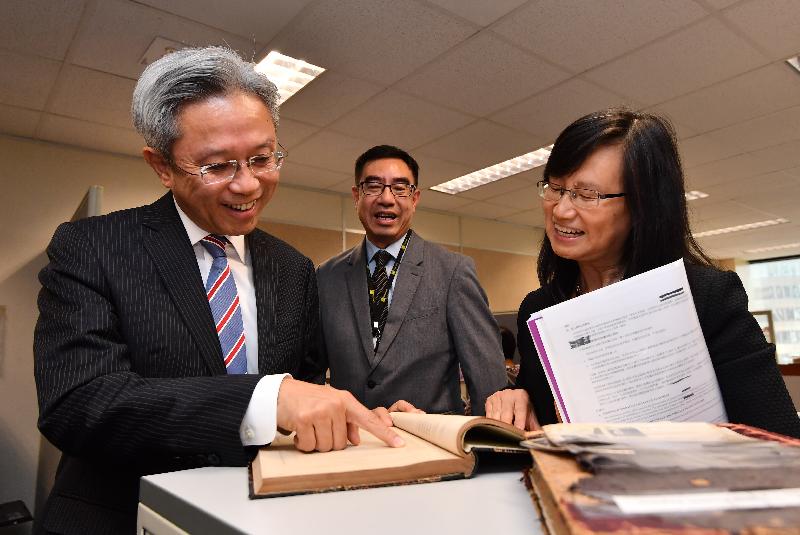The Immigration Department (ImmD) mounted a series of territory-wide anti-illegal worker operations, including an operation codenamed "Twilight" and joint operations with the Hong Kong Police Force and the Labour Department codenamed "Champion" and "Powerplayer" from May 14 to 17. A total of 21 illegal workers and four suspected employers were arrested.
During operation "Twilight", ImmD Task Force officers raided 45 target locations including a factory, a fruit stall, a garage, recycling shops, recycling yards, residential flats, restaurants, commercial buildings, garbage collect depots and an industrial building under renovation. Sixteen illegal workers and three employers were arrested. The illegal workers comprised 11 men and five women, aged 26 to 62. Among them, two men were holders of recognisance forms, which prohibit them from taking any employment. Furthermore, a man and a woman were also suspected of using and being in possession of forged Hong Kong identity cards. Meanwhile, three men, aged 42 to 56, were suspected of employing the illegal workers.
During operation "Champion", enforcement officers raided three target restaurants in Central. Two illegal workers and an employer were arrested. The illegal workers comprised two men, aged 29 and 38 respectively. Among them, a man was a holder of a recognisance form, which prohibits him from taking any employment. Meanwhile, a man, aged 50, was suspected of employing an illegal worker.
Furthermore, during operation "Powerplayer", enforcement officers raided 16 target locations in Kowloon East district including restaurants and industrial buildings. Three illegal workers were arrested. The illegal workers comprised two men and a woman, aged 28 to 56. Among them, a man was a holder of a recognisance form, which prohibits him from taking any employment.
"Any person who contravenes a condition of stay in force in respect of him shall be guilty of an offence. Also, visitors are not allowed to take employment in Hong Kong, whether paid or unpaid, without the permission of the Director of Immigration. Offenders are liable to prosecution and upon conviction face a maximum fine of $50,000 and up to two years' imprisonment. Aiders and abettors are also liable to prosecution and penalties," an ImmD spokesman said.
The spokesman warned that, as stipulated in section 38AA of the Immigration Ordinance, illegal immigrants or people who are the subject of a removal order or a deportation order are prohibited from taking any employment, whether paid or unpaid, or establishing or joining in any business. Offenders are liable upon conviction to a maximum fine of $50,000 and up to three years' imprisonment. The Court of Appeal has issued a guideline ruling that a sentence of 15 months' imprisonment should be applied in such cases.
The spokesman also warned that it is an offence to use or possess a forged Hong Kong identity card or a Hong Kong identity card related to another person. Offenders are liable to prosecution and a maximum penalty of a $100,000 fine and up to 10 years' imprisonment.
The spokesman reiterated that it is a serious offence to employ people who are not lawfully employable. The maximum penalty is imprisonment for three years and a fine of $350,000. The High Court has laid down sentencing guidelines that the employer of an illegal worker should be given an immediate custodial sentence. According to court sentencing, employers must take all practicable steps to determine whether a person is lawfully employable prior to employment. Apart from inspecting a prospective employee's identity card, the employer has the explicit duty to make enquiries regarding the person and ensure that the answers would not cast any reasonable doubt concerning the lawful employability of the person. The court will not accept failure to do so as a defence in proceedings. It is also an offence if an employer fails to inspect the job seeker's valid travel document if the job seeker does not have a Hong Kong permanent identity card. The maximum penalty for failing to inspect such a document is imprisonment for one year and a fine of $150,000.
Under the existing mechanism, the ImmD will, as a standard procedure, conduct initial screening of vulnerable persons, including illegal workers, illegal immigrants, sex workers and foreign domestic helpers, who are arrested during any operation with a view to ascertaining whether they are trafficking in persons (TIP) victims. When any TIP indicator is revealed in the initial screening, the officers will conduct a full debriefing and identification by using a standardised checklist to ascertain the presence of TIP elements, such as threat and coercion in the recruitment phase and the nature of exploitation. Identified TIP victims will be provided with various forms of support and assistance, including urgent interference, medical services, counselling, shelter, temporary accommodation and other supporting services. The ImmD calls on TIP victims to report crimes to the relevant departments.



